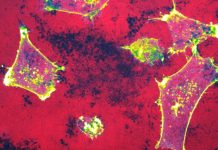The potential pancreatic cancer treatment combines ultrasound and immunotherapy, with substantial “anti-cancer” benefits seen in lab mice
Pancreatic cancer is notoriously bleak, with five year survival rates among the lowest in contrast to other cancers.
According to Professor Giuseppe Lippi, University Hospital of Verona, Italy: “Pancreatic cancer is still considered one of the most lethal malignancies, since it remains silent (i.e., does not cause suggestive signs or symptoms) for a rather long time. Then, when patients become symptomatic, the cancer has usually reached an advanced and very frequently incurable stage.”
Over 25 years going back from 2020, data compiled by Professor Lippi suggests that pancreatic cancer prevalence increased by 55% globally. In 2017, there were nearly half a million new cases documented. With ongoing levels of pandemic healthcare backlog faced by countries across the globe, this “silent” cancer has even more room to devastate.
A team of scientists, led by The Institute of Cancer Research, London, investigated pancreatic tumours in mice – with hopeful and interesting results.
What is the new potential treatment for pancreatic cancer?
A combination of ultrasound and immunotherapy.
Essentially, sound waves (in this case, pulsed HIFU exposure) are used to break the tumour into a more fragile state, with cavities – which allows the boosted immune cells to enter those tumours via the newly created spaces.
In their study, published in the Royal Society Interface, the team used pulsed focused ultrasound, ‘pHIFU’, alongside injections of antibodies that mimic the effects of immune checkpoint inhibiting drugs.
The researchers found that mice receiving the HIFU-antibody combination lived longer than mice treated with neither or just one of the treatments.
What is acoustic cavitation?
A key point that excites researchers about these findings, is the evidence that sound waves can create significant weakness in an ordinarily dense tumour.
This is called acoustic cavitation.
Acoustic cavitation is the term used to describe the rapid vibration of tiny ‘microbubbles’ of gas by the sound waves, and it is this which is thought to be enhancing the uptake of immune cells into the tumours by breaking them up – the shaking breaks up the tumour cells, causing them to spill their contents.
The spill then also alerts the immune system, attracting immune cells to the site to fight the cancer.
Study lead Professor Gail ter Haar, Professor of Therapeutic Ultrasound at The Institute of Cancer Research, London, said: “This is the first ever study to show the anti-cancer benefit of these two treatments, HIFU in combination with immunotherapy, in pancreatic cancer. This study paves the way for clinical trials of treating pancreatic cancer patients with HIFU, and we will be developing HIFU-delivery platforms to achieve that.”
When will this treatment be available?
While this study has been described as ground-breaking, there is yet more ground to break before it reaches patients en masse. The team are prepping to do more trials, in order to progress to clinical studies involving humans.
Study author Dr Petros Mouratidis, Higher Scientific Officer in Therapeutic Ultrasound at The Institute of Cancer Research, London, said: “High intensity focused ultrasound has shown potential in a range of cancer types and is of particular interest in pancreatic cancer – because tumours can be hard to access for surgery, and sound waves can physically weaken tumours and could allow other treatments, including immunotherapies, to have greater effect.
“We hope our study ultimately leads to a new type of treatment for patients with pancreatic cancer.”











